WordPress introduced a site health check feature in version 5.1, which was further improved in WordPress 5.2, including a site health check score.
This feature helps website owners keep an eye on the performance and security issues that may affect their sites. It may not seem straightforward, but it’s not hard to learn how to properly use the site health feature and what it can or cannot do.
In this article, we will show you how to fix the ‘should be improved’ score to a good score in the WordPress site health check. We will also answer some commonly asked questions about the site’s health features.
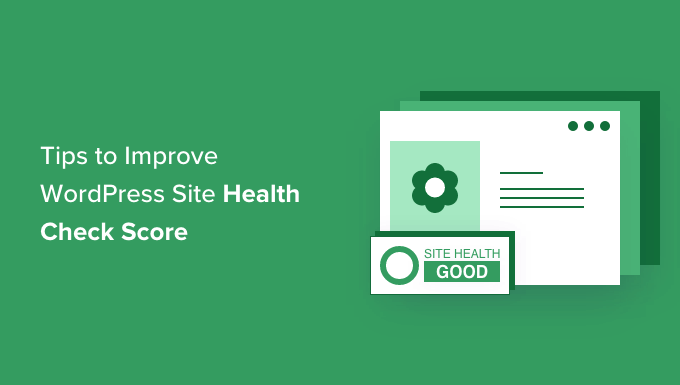
What is WordPress Site Health Check Score?
WordPress Site Health Check Score is a feature in WordPress that looks for common performance and security issues and gives a health check score based on various tests.
You can view your site health score by visiting the Tools » Site Health page in your WordPress admin area.

WordPress powers more than 43% of all websites on the internet. Most people who make a website using WordPress are beginners and non-tech users.
Site Health feature runs a series of tests to see if their website is performing with optimal settings and the latest server software.
How can a good site health score help your WordPress site?
The site health feature runs a series of tests to look for common performance and security issues on a WordPress website.
One example is a test that checks if your website is running the latest PHP version. Using older PHP versions can make your website slow and/or misbehave with many popular WordPress plugins.
Getting a better site health check score ensures that your website is running under optimal conditions to maximize your WordPress speed and performance.
That being said, let’s take a look at how to get a good score in the WordPress site health check.
Video Tutorial
If you’d prefer written instructions, keep reading.
1. Get a Better WordPress Hosting
Nothing impacts a website’s performance more than the web hosting service. This is the most important decision you make for a website.
Using an unreliable hosting provider can affect your WordPress site in many ways.
They tend to use older software and do not have all the PHP modules installed, and there is no easy way for users to fix those issues.
Choosing a WordPress hosting company with a proven track record provides you with a solid platform to build your website.
We recommend using Bluehost, SiteGround, or Hostinger. They are all officially recommended WordPress hosting providers and the biggest names in the hosting industry.
For more hosting recommendations, see our complete guide on how to choose the best WordPress hosting for your website.
2. Install SSL / HTTPS in WordPress
SSL protects your website by encrypting the data transfer from the server to the user’s browser. SSL-enabled websites use HTTPS instead of HTTP in their URLs and have a padlock icon in the address bar.

To switch from HTTP to HTTPS, you will need to install an SSL certificate on your website. Most of our recommended WordPress hosting providers offer free Let’s Encrypt SSL certificates that you can use.
For more details, see our guide on how to get a free SSL certificate for WordPress with step-by-step instructions on how to set it up.
3. Keep WordPress Up to Date
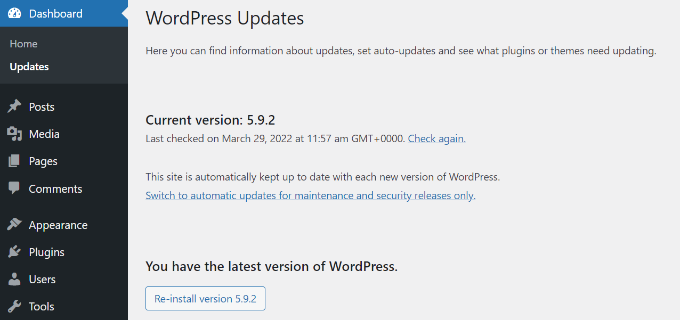
WordPress is regularly maintained open-source software. Each new WordPress release brings new features and bug fixes and improves the security of your website.
Many beginners fear that updating WordPress could break their website. They ignore WordPress updates and, as a result, leave their websites vulnerable to security threats.
You need to make sure that you are always using the latest version of WordPress. For detailed instructions, see our guide on how to update WordPress with step-by-step instructions.
4. Keep WordPress Plugins and Theme Updated
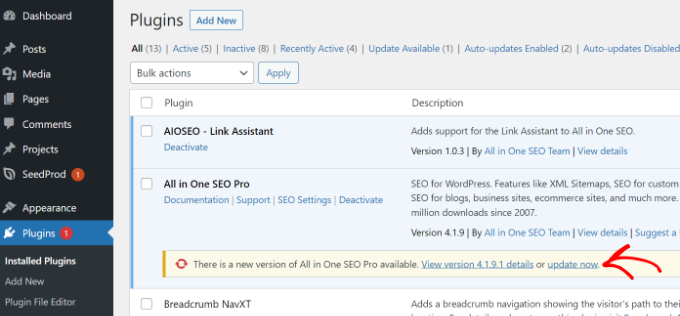
Just like WordPress itself, WordPress themes and plugins are also regularly updated. You need to keep an eye out for the available updates and install them to keep your site updated.
Plugins and themes use updates to deliver new features, fix bugs, and close security issues. You need to install updates to make sure that your website is not vulnerable to any known security issues.
For plugins, see our guide on how to properly update WordPress plugins.
For WordPress themes, you can simply go to the Appearance » Themes page to install an update.
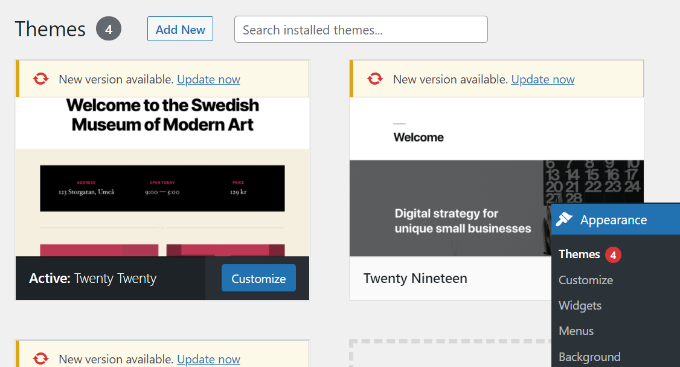
You can also update a WordPress theme manually. In case you’re wondering about the order to do updates, check out our guide on whether you should update WordPress core or plugins first.
5. Use The Latest MySQL or MariaDB Version
WordPress stores all your website content in a database. By default, WordPress supports database management software like MySQL and MariaDB (a fork of MySQL).
Using the latest version of MySQL or MariaDB ensures that WordPress can safely store your website data. An older version may cause your website to behave unexpectedly.
You need to make sure that your website is running the latest stable version of MySQL/Maria. You can find the information about your database software version by going to the Tools » Site Health page and switching to the ‘Info’ tab.
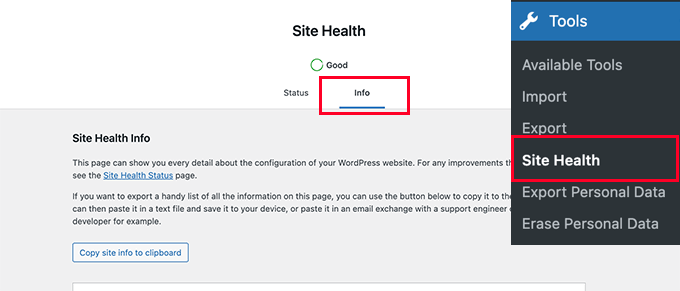
After that, scroll down to the ‘Database’ section and click on it to check your database version.
You can see whether you’re using MySQL or MariaDB in front of Extension and also view its Client version.
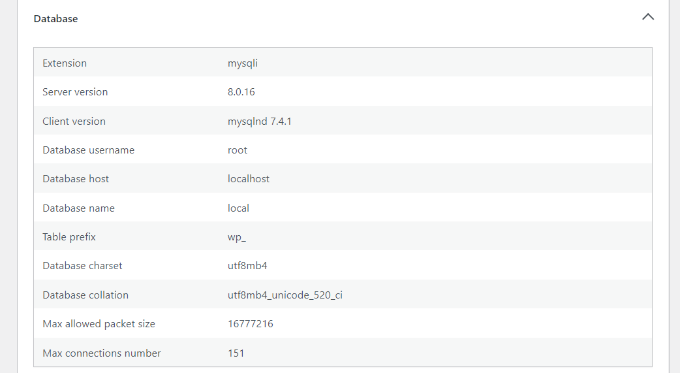
If your website is using an older version of MySQL or MariaDB, then you need to contact your WordPress hosting provider and ask them to update it.
6. Use The Latest PHP Version
WordPress is written in the PHP programming language. It is a server-side language, which means it runs on your hosting server to dynamically generate WordPress pages.
Using the latest PHP version gives your website a performance boost. It also ensures compatibility with new WordPress plugin features that may require the latest PHP version to work correctly.
You can check your PHP version in the Info tab under Site Health. Simply scroll down to the ‘Server’ section and see the PHP version.
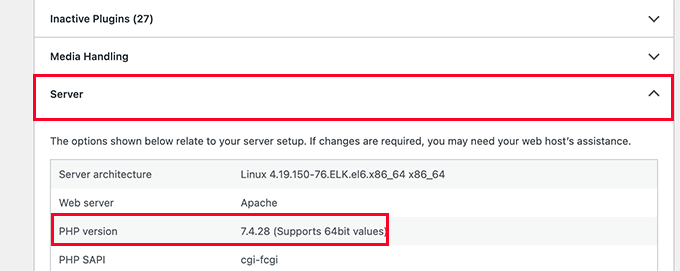
For more details, see our article on how PHP updates affect your website.
If your website is using an older version of PHP, then you will need to ask your hosting provider to update it for you. Some hosting companies like Bluehost and WP Engine allow you to change the PHP version from the control panel.
You can follow our step-by-step guide on how to update your PHP version in WordPress.
7. Keep WordPress Automatic Updates Enabled
WordPress comes with a built-in ability to update itself and install the latest security releases. These are minor releases but crucial for the safety and security of your website.
However, site owners do have the ability to turn off automatic WordPress updates. This can be done by using an update manager plugin or by adding code in the wp-config.php file.
These security updates are automatically installed on millions of websites. Make sure that automatic updates are enabled on your WordPress site to keep your site secure with these timely updates.
After installing updates, it’s a good idea to also back up your WordPress site before major updates or changes. This gives you peace of mind, knowing you can easily restore your site to its previous state if needed.
8. Remove Unused WordPress Plugins & Themes
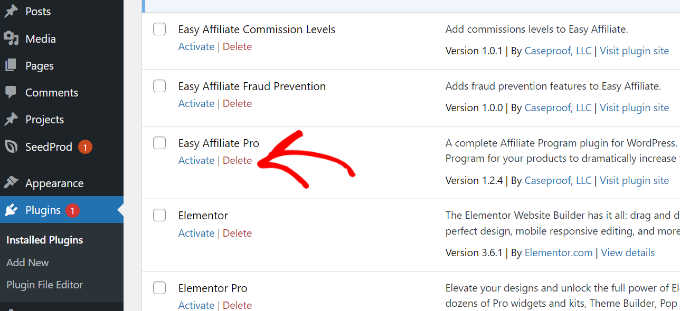
Technically, you can use any number of WordPress plugins on your website as long as they are well-coded.
You can keep inactive plugins installed on your WordPress site. They are not loaded by WordPress and do not affect your website’s performance or speed.
However, it is recommended that you delete any inactive plugins that you don’t need. They take up space on your server, can be used to hide malware, increase security scan time, and there is a chance you may accidentally activate them.
For more information, see our article on why you should delete inactive WordPress plugins.
9. Keep Rest API Enabled
REST API in WordPress allows developers to securely use HTTP requests to perform actions on a WordPress site.
Many site owners disable REST API to protect their websites against brute force attacks.
However, site health does not recommend it because you may need REST API to use third-party apps or some WordPress plugins. Make sure that REST API is enabled to improve your WordPress site health score.
Editor’s Note: Here at Awesome Motive, we keep the REST API disabled on our sites to prevent brute-force attacks.
10. Make Sure Required PHP Modules are Installed
PHP Modules and extensions are additional libraries that extend the functionality of the PHP programming language. WordPress recommends that several PHP modules be installed for optimal performance.
You can find a list of extensions on the WordPress website. Some of these extensions are required, and others are recommended but not necessary.
Now, how do you install a missing module?
You will need to ask your hosting providers to install these extensions for you. Some web hosting providers allow you to install them from the hosting dashboard. If you’re using Bluehost, then look for ‘PHP PEAR Packages’ under Software in the Advanced tab.
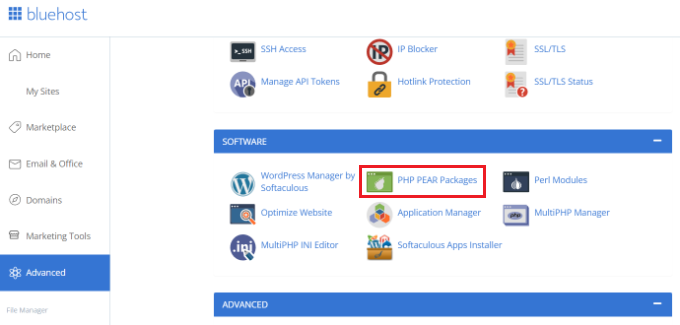
However, you would still need to configure them in the php.ini file, which may not be easy for beginners.
11. Disable WordPress Debug Mode
WordPress comes with a built-in debug mode, which allows you to see if a plugin, theme, or custom code is throwing some errors. This feature is intended for developers or advanced users.
It is not recommended to turn on the WordPress debug mode for a live website. It may show warnings and notices in the WordPress admin area, which affect the user experience.
12. Make Sure WordPress Can Run Scheduled Jobs
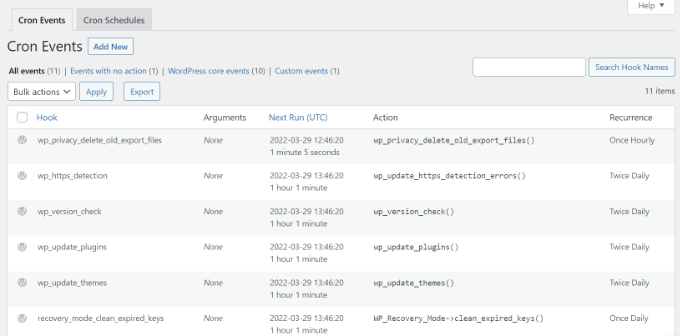
Your WordPress website needs to perform scheduled tasks like checking for updates. These tasks use a system called cron jobs.
Sometimes, your hosting environment may block them from running, or you may accidentally end up stopping WordPress cron jobs.
You need to make sure that WordPress can run these scheduled tasks to improve your site health score.
Frequently Asked Questions about WordPress Site Health Feature
WordPress site health feature provides excellent suggestions and recommendations. However, some questions still may arise in your mind.
Here, we will try to answer some of those questions.
Which site health checks are more important?
Site health tests are given three status labels:
- Good (Passed tests)
- Recommended (changes are recommended but not necessary)
- Critical (significant issues that you must consider fixing)
Critical issues are more important, and you should consider fixing them first.
Does the perfect site health score mean my WordPress website is secure?
No, the site health score indicates that your WordPress installation uses the recommended WordPress settings. You would still need to improve WordPress security to protect your website against common threats.
How do I troubleshoot a WordPress site?
The site health feature also provides you with debugging information that can be used for troubleshooting. Simply switch to the info tab, and from here, you can find detailed information about your WordPress install.

For example, you can find which PHP version your site is using or how much memory limit is allowed on your site.
However, if you need to troubleshoot further, then see our guide on how to troubleshoot WordPress issues step by step.
We hope this article helped you learn how to get a good score on WordPress’s site health check. You may also want to see our guide on choosing the best WordPress caching plugin and best WordPress page builder plugin for your website.
If you liked this article, then please subscribe to our YouTube Channel for WordPress video tutorials. You can also find us on Twitter and Facebook.





Syed Balkhi says
Hey WPBeginner readers,
Did you know you can win exciting prizes by commenting on WPBeginner?
Every month, our top blog commenters will win HUGE rewards, including premium WordPress plugin licenses and cash prizes.
You can get more details about the contest from here.
Start sharing your thoughts below to stand a chance to win!
Jiří Vaněk says
For a long time I was worried about the health of the site, but I finally decided to focus only on the really important items, because from my point of view it is impossible to fulfill everything. For example, I have CRON disabled on WordPress via wp-config, and I handle it via CRON directly on the server. And of course, WordPress doesn’t like that, and it tells me right away with site health. So, in the end, I only focused on security risks, and I deal with the rest as I see fit, directly on the server. However, thanks for the list of things to watch out for.
Dave Kaplan says
Is there a plugin or tool to generate a PDF report for site health? I’m looking for something that generates a report I can share with a client.
Jiří Vaněk says
Hello, try to install plugin Health Check & Troubleshooting
comfortfinds says
What is the WP Cron scheduled task?
WPBeginner Support says
We explain that on the linked article, you can take a look here: https://www.wpbeginner.com/plugins/how-to-view-and-control-wordpress-cron-jobs/
Admin
Satwiky says
Hi
Very nice article and heipful thanks for sharing.
WPBeginner Support says
Thank you, glad you like our article
Admin
Youknowme says
Can you fix my problem, in , my WordPress site keeps getting 502 bad getwey, about 10 to 15 times a day.what is restion and what is 502 bad getwey
WPBeginner Support says
For troubleshooting that error, you would want to take a look at our guide here: https://www.wpbeginner.com/wp-tutorials/how-to-fix-the-502-bad-gateway-error-in-wordpress/
Admin
Md. Alamgir Hosain says
Very helpful article. Thanks a lot to wpbeginner.com
WPBeginner Support says
You’re welcome, glad it was helpful
Admin